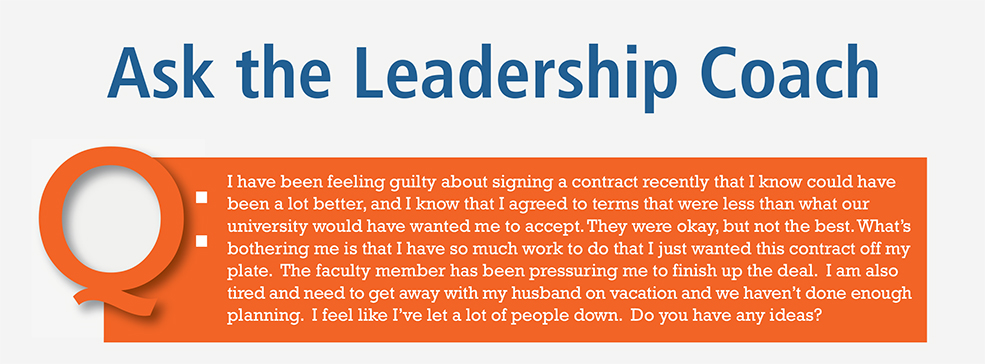Thanks for your question and for describing what sounds like a challenging period in your life. You started your question with regrets about a work product that you finished (i.e. contract) but then moved to broader questions of multiple matters. I do not know from the description whether this state-of-being describes you some of the time, rarely, or frequently. In other words, how often do you use words or phrases like “guilty”, “bothering”, “pressuring”, “tired”, “letting people down”? What I am wondering is if this sense of worry and, perhaps, feeling overwhelmed is a pervasive part of your life?
You might ask yourself how often you are experiencing life in this way. Some may read your question and think that you would benefit from better time management or prioritization. Others may be stuck on the facts about the contract you signed and whether this caused harm to the university in some way. Or, are you revealing something else by saying that the contract terms “were okay, but not the best.” I would imagine that few of us have ever signed a perfect contract, because a contract is a product of negotiations between flawed human beings and institutions. Perfection is a tough expectation for negotiations, or for vacation planning for that matter!
I think there are plenty of books and articles about time management, so I will leave that to you to pursue. And, there are seminars about contract negotiations and strategies. What I will discuss with you is the relevance of energy as a factor in managing your work and life. Maybe this will help you think of your challenges in different and new terms. There is growing literature in the coaching world about energy, and how we acquire it, useit, and how we replenish it. It’s a great coaching topic.
As human beings we get energy from food, from sleep, exercise, and from a sense of flow in our work and personal lives. We get it from our passions, from sports, arts, music, from walking in nature, from listening to birds or the sounds of waves. Some people meditate to gain control over their thought processes which, in turn, helps energize and focus them. The point is that the successful acquisition and expenditure of human energy is intentional and it can help us manage ourselves in times of stress. It also gives us means of replenishing ourselves. Katherine Ebner, director of the Institute for Transformational Leadership at Georgetown University, wrote a series of questions for coaches to ask clients relating to energy in the book On Becoming a Leadership Coach. Among my favorites are: “What gives you energy?” “What drains your energy away?”,“What do you look forward to doing? “What gives you dread?” “What is your typical energy level in the morning? Midday? Evening?” “What do you do to refuel your energy?” And many more energy-inventory types of questions. What would your answers be to her questions?
But, how does this relate to your question? I am suggesting that thinking of life’s challenges and time pressures in terms of the energy and capacity we have, and can create for ourselves, will help us “budget” ourselves (minds, bodies, spirit) to deal with the most pressing issues at hand. And to deal with them well. Energy is not a panacea, but a way to help usunderstand ourselves better and to help us be aware of own personal gas tanks. So, when we see we are running low, we can take care of ourselves and restore ourselves so we can better cope with the challenges we face.
You mention guilt and letting people down. So, that might be another approach to take were we in a coaching relationship. I might ask you how you feel you are letting someone down, and how is that serving you or the situation. What would you need to do to let go of guilt? That is a very challenging topic for most of us, so I do not imply that the matter of guilt is addressed with a few questions, in the manner of a 30 minute television sitcom! It is just that guilt may be draining energy from you in ways that are keeping you from being more productive, happy, and forward focused.
Finally, the situation you presented juxtaposed signing a contract, with keeping a PI happy, and with taking a vacation with your husband. It sounded to me like you were thinking of all of these parts of the situation as separate, as either/or. I would simply challenge you to think that no one needs to be let down, starting with you. And, you could have the energy and capacity to do all of the responsibilities you take on, and to do them well. Be intentional about it.
 Garry Sanders is an executive coach and graduate of Georgetown University’s Certificate Program in Leadership Coaching. Garry is a long-time research administrator and recipient of NCURA’s Distinguished Service Award. He can be reached at gsanders@assistleadership.com and (518) 588-0992.
Garry Sanders is an executive coach and graduate of Georgetown University’s Certificate Program in Leadership Coaching. Garry is a long-time research administrator and recipient of NCURA’s Distinguished Service Award. He can be reached at gsanders@assistleadership.com and (518) 588-0992.

